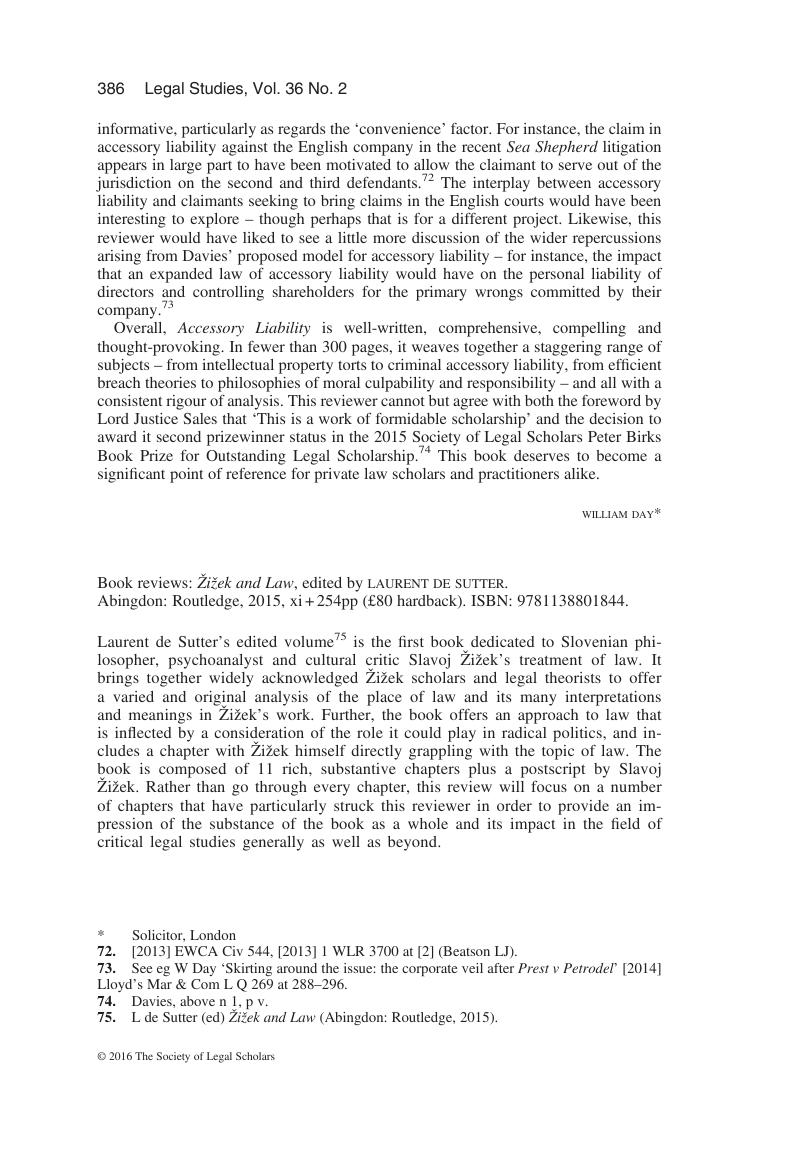No CrossRef data available.
Published online by Cambridge University Press: 02 January 2018

75. L de Sutter (ed) Žižek and Law (Abingdon: Routledge, 2015).
76. M Aristodemou ‘The pervert's guide to the law: clinical vignettes from Breaking Bad to breaking free’ in de Sutter, ibid, pp 13–30.
77. Ibid, p 13.
78. [2012] UKSC 56.
79. Aristodemou, above n 2, p 14.
80. See also Žižek, S Looking Awry: An Introduction to Jacques Lacan Through Popular Culture (Cambridge, MA: The MIT Press, 1992);Google Scholar and Žižek, S In Defense of Lost Causes (London: Verso, 2008).Google Scholar
81. Aristodemou, above n 2, p 21.
82. Ibid, p 26.
83. Lacan, J The Ethics of Psychoanalysis: The Seminar of Jacques Lacan 1959–1960: Book VII (Abingdon: Routledge Classics, 2008).Google Scholar
84. Aristodemou, above n 2, p 28.
85. MA Rothenberg ‘Changing the subject: rights, revolution, and capitalist discourse’ in de Sutter, above n 1, pp 42–59.
86. See in particular Žižek, S The Parallax View (Cambridge, MA: The MIT Press, 2006); and S Žižek Jacques Lacan's Four Discourses; available at http://www.lacan.com/zizfour.htm (accessed 1 May 2015).CrossRefGoogle Scholar
87. Lacan, J The Other Side of Psychoanalysis: The Seminar of Jacques Lacan Book XVII (New York: WW Norton, 2007).Google Scholar
88. Žižek, S Enjoy Your Symptom! Jacques Lacan in Hollywood and Out (New York: Routledge Classics, 2008).Google Scholar
89. See eg Fink, B The Lacanian Subject: Between Language and Jouissance (Princeton, NJ: Princeton University Press, 1995) p 44.Google Scholar
90. Rothenberg, above n 11, p 43; emphasis in the original.
91. Ibid.
92. J Lacan Discourse of Jacques Lacan at the University of Milan on May 12, 1972, trans JW Stone; available at http://web.missouri.edu/~stonej/Milan_Discourse2.pdf (accessed 23 April 2015).
93. Rothenberg, above n 11, p 50.
94. C McMillan ‘Changing fantasies: Žižek and the limits of democracy’ in de Sutter above n 1, pp 60–79.
95. Ibid, p 60.
96. Ibid, p 61.
97. See eg Žižek, S In Defence of Lost Causes (London: Verso, 2008).Google Scholar
98. McMillan, above n 20, p 71; emphasis in the original.
99. Žižek, S The Year of Dreaming Dangerously (London: Verso, 2012).Google Scholar
100. F Vighi ‘The ambiguous remainder: contemporary capitalism and the becoming law of the symptom’ in de Sutter above n 1, pp 80–97.
101. Ibid, p 80; emphasis in the original.
102. Ibid. Vighi draws upon, in particular, Žižek, S The Sublime Object of Ideology (London: Verso, 2008)Google Scholar and The Metastases of Enjoyment (London: Verso, 2005).Google Scholar
103. Vighi, above n 26, p 95.
104. Ibid, p 96.
105. S Žižek ‘Postscript: the rule of law between obscenity and the right to distress’ in de Sutter, above n 1, pp 220–247.
106. Ibid, p. 220.
107. Žižek, above n 31, p 225.
108. Ibid.
109. Ibid, p 232.
110. Rothenberg, above n 11, p 58.